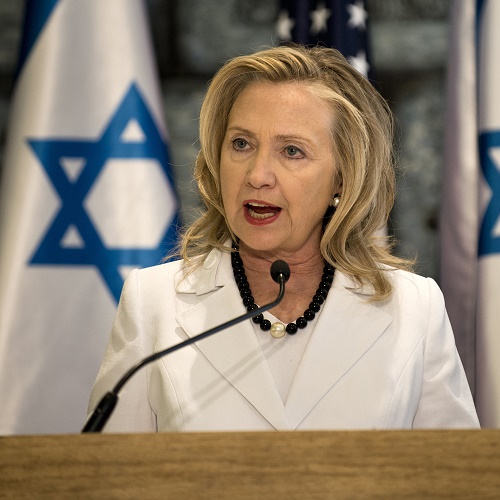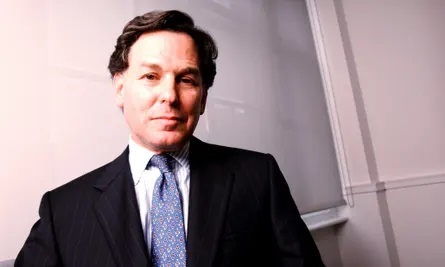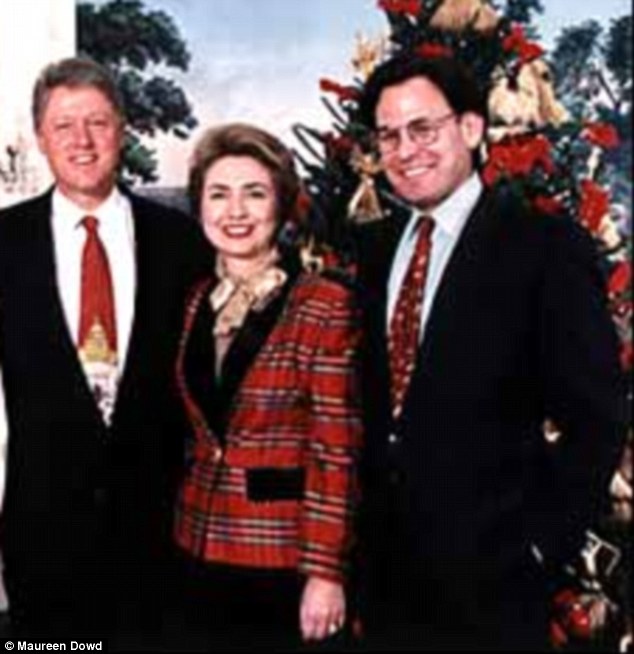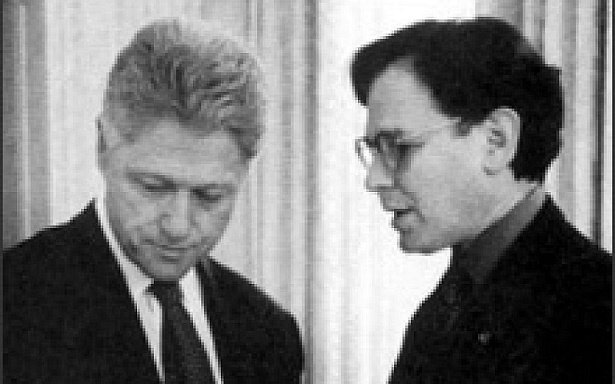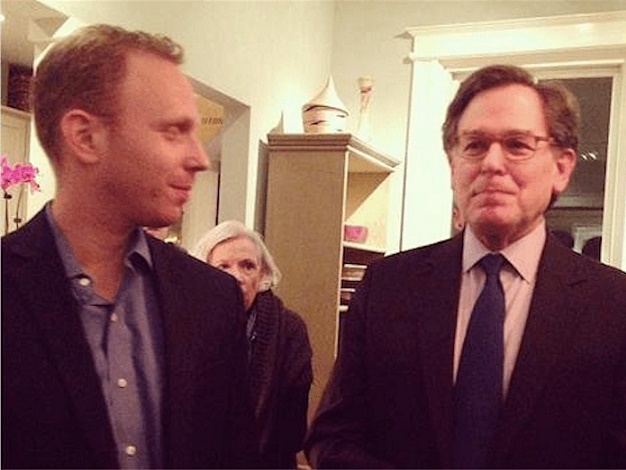Jewish activist and Israel's White House mole Sidney Blumenthal, Hillary Clinton and the 2011 Libya War
Freedom Research, 2017

The murderous war on Libya in 2011, was very much a Jewish-Zionist project. The main man behind the war mongering US Secretary of State Hillary Clinton - serving as her eyes and ears in the prelude to the attack - was the Jewish adviser Sidney Blumenthal.In France - the "European" power most fanatic to attack and crush Libya - the Jew Nicolas Sarkozy held the reigns of control. His Jewish henchman and "Mr Fixit" on his part, was the fanatically Zionist French-Algerian Jew, Bernard-Henri Lévy.
In this project we can thus see Western governments hijacked by a small cabal of tribalists, working for a foreign power - Israel - and (mis-)using their respective countries' diplomatic and military mights to attain gains that only serve Israel's needs.
It should apart from this also be noted that US Secretary of State Hillary Clinton's own daughter, Chelsea, is married into the Jewish tribe, having in 2010 wed the Jew Marc Mezvinsky.
Hillary Clinton's deep connection with the same tribal group and Israel Firsters is well documented in our special section dedicated to Hillary Clinton and Jewish Power, and that of her husband Bill Clinton. Here you will for instance find the article "Hillary Has Jewish Roots - Second Husband Of Grandmother Was Jewish"
Julian Assange, who since his couragous revelations has lost years of his life in defence of freedom of information, had this to say on Hillary Clinton's responsability for the Libya war, and on the actions of Sidney Blumenthal.
Libya, more than anyone else's war, was Hillary Clinton's war. Barak Obama initially opposed it. Who was the person who was championing it? Hillary Clinton. That's documented throughout her emails. She put her favoured agent in effect, Sidney Blumenthal, onto that; there's more than 1700 e-mails out of the 33,000 Hillary Clinton e-mails that we've published, just about Libya. It’s not about that Libya has cheap oil — she perceived the removal of Gaddafi and the overthrow of the Libyan state — something that she would use to run in the general election for President.
So in late 2011 there is an internal document called the Libya Tick Tock that is produced for Hillary Clinton, and it's the chronological description of how Hillary Clinton was the central figure in the destruction of the Libyan state. As a result there was around 40,000 deaths within Libya, jihadists moved in, ISIS moved in. That lead to the European refugee and migrant crisis, because not only did you have people fleeing Libya, people then fleeing Syria, the destabilisation of other African countries as a result of arms flows. The Libyan state itself was no longer able to control the movement of people through it.
- Julian Assange of WikiLeaks, interviewed by renowned Australian journalist John Pilger, Dartmouth Films, 2016.
So Assange labels Sidney Blumenthal "her favoured agent".
The Zionist leanings of Nicolas Sarkozy are well documented in our section on contemporary French politics, and our large French language section.
Sarkozy's right hand in the Libya Destruction Project - Bernard-Henri Lévy - has also on several occasions shown his Zionist colours. For instance already in November 2011 he declared his participation in the war on Libya as part of his Jewishness and pro-Israelism:
"Months later, Benard-Henri Lévy boasted to the highly influential Conseil Représentatif des Institutions juives de France (CRIF) that it was "as a Jew" that he had intervened in Libya. "I carried the banner of loyalty to my name and my loyalty to Zionism and Israel" he declared at a CRIF conference on "Tomorrow the Jews of France."It is as a Jew that I participated in that political adventure, that I contributed to defining the militant fronts, that I contributed to elaborating a strategy and tactics for my country and for others. I wouldn't have done it if I hadn't been Jewish."- BHL quote on his Zionism and Libya War in the book "Circle in the Darkness: Memoir of a World Watcher", by Diane Johnstone, 2020. The quote can also be seen in Le Figaro, "Libye: BHL s'est engagé "en tant que juif"" (November 20, 2011).
Note: When Levy says "for my country", he of course - as the proclaimed Zionist he is - means Israel, the country of his loyalties.
The rest of this document will focus on the shady Jewish character Sidney Blumenthal. We will site articles in part and full and also at the end of the document publish some relevant photos, and also delve a little on Sidney Blumenthal's son, Max, famous in anti-Zionist circles as an activist critical of Israel.
Firstly we quote at length from a VICE News article on Sidney Blumenthal's role in the Libya war, entitled "Libyan Oil, Gold, and Qaddafi: The Strange Email Sidney Blumenthal Sent Hillary Clinton In 2011" (January 12, 2016), written by Jewish-American journalist Avi Asher-Schapiro:
Nearly a third of all the emails she [Hillary Clinton] received on the security and political situation in Libya during her tenure as Secretary of State came from Blumenthal, a longtime Clinton associate who was not formally employed by the State Department. He was on the payroll of the Clinton Foundation, bringing in $10,000 a month as a consultant, while pursuing his own business interests in Libya. [...]
Clinton's correspondence reveals that Blumenthal regularly sent her intelligence-cable-style updates on Libya that cited anonymous sources who claimed to be close to the country's political elites.
These briefs were prepared by Blumenthal's business partner and former CIA operative Tyler Drumheller, a consultant with plans to take advantage of economic opportunities in a post-war Libya. Both Drumheller and Blumenthal worked with a Libyan company called Osprey, a start-up that hoped to profit off medical and military contracts in the chaos after the war.
Though those contracts may have eventually needed the approval of Clinton's State Department, Blumenthal has repeatedly denied he intended to use his connections to the Secretary of State to further his business interests. [...]
Much of the intelligence Blumenthal fed to Clinton was quite odd. One email suggested that Libyan elites wanted warm relations with Israel, [...]On Aug. 27, 2012, for instance, Blumenthal's intelligence claimed that a new Libyan president would "seek a discreet relationship with Israel." Then, Clinton forwarded on the e-mail to her top policy aide Jacob Sullivan with a note attached: "If true, this is encouraging. Should consider passing to Israelis." [...]
So here we see that this Israeli mole, Blumenthal, spices up his informations/"intelligence" to give it a "good for Israel" touch, to make it all the more alluring for Hillary Clinton. This in itself quite revealing as to the level of Zionist rot in the higher corridors of power in the US."If you want to affect a US politician, say that the policy will be good for Israel", seems to be the current jargong.
The VICE News article also deals with France, i.e. Zionist Jew Sarkozy's relationship with Muammar Gaddafi and the former's dark and vicious motives for stabbing Gaddafi in the back, attacking Libya, and finally killing him:The VICE News journalist dismisses Blumenthal's memo that France/Sarkozy was triggered to oust Gaddafi when the latter started an ambitious project to use huge Libyan reserves of gold and silver to prop up a new African currency. A move that would have threatened the French CFA franc's hegemony in France's former African colonies, a currency guaranteed by the French treasury.
After French intelligence officials got wind of this secret plan, the Blumenthal memo reports, Sarkozy freaked out: "This was one of the factors that influenced [his] decision to commit France to the attack on Libya."This, what Avi Asher-Schapiro calls "trope on conspiracy theory websites", is dismissed by Asher-Schapiro due to the timeline of events, albeit the VICE article notes:
It was, however, well known in Libya watcher circles that Gaddafi had some designs to start his own monetary system.
VICE's Jewish journalist stashes a list of other reasons for Sarkozy's attack on Libya, which we here quote in full:
In the spring of 2011, Sarkozy took the lead among European nations in pushing for an air campaign against Qaddafi. As protests against the regime began to devolve into a bloody civil war, Sarkozy sent the famous French intellectual, Bernard Henri-Levy — who, the Blumenthal memo says, was considered in Libya a "self-promoter" and a "semi-useful, semi-joke figure" — to meet with rebels in the National Transition Council (NTC).
Shorter after, Sarkozy invited Council leader Mustafa Abdul Jalil to the Elysee Palace, recognized the NTC — which the Blumenthal memo refers to as "France's client" — as the country's official government, and began pressuring other NATO countries to take military action in Libya.
Just two weeks before Blumenthal sent the Gaddafi-gold memo, Clinton met with Sarkozy in France, where the president pressed her to back an air campaign in Libya. At the time, in justifying his enthusiasm for military intervention, Sarkozy said publicly that France had "decided to assume its role before history" to ward off a "killing spree." The French military, he said, was determined to defend any Libyans who wanted "liberate themselves from servitude."
The Blumenthal memo tells a very different story. Aside from fears over the new Libyan-backed African currency, Blumenthal's sources reported to Clinton that Sarkozy was motivated by four primary concerns: Libyan oil, an opportunity to increase French influence in Northern Africa, a global stage for the French military to strut its stuff, and Sarkozy's desire to improve his domestic standing.
It's true that in the spring of 2011, Sarkozy was headed into an election the following year with almost 70 percent of French citizens expressing disapproval of his job performance. Some saw Sarkozy's decision to intervene as a desperate move to recover from these record popularity lows. Statistics published by pollster TNS Sofres in February 2011 showed that 66 percent of the population supported France's intervention in Libya.
Coincidentally, the French president was seriously tainted by a formerly cozy relationship with Libya's dictator.
Qaddafi traveled to France in December 2007, immediately after Sarkozy's first election as president, for a controversial five-day visit aimed at brokering a $200 million arms deal. Sarkozy proved solicitous to the Libyan dictator: he allowed him to hunt in the Rambouillet forest, once the hunting preserve of French kings, and to take a private tour of the Louvre museum with his female bodyguards. Qaddafi also requested, and got, permission to pitch a heated Bedouin tent in the gardens of the Hôtel de Marigny, which is used as a residence for state visitors. (To be fair, he was allowed the same privilege during a visit to Italy.)
According to French daily Le Monde, Sarkozy allegedly said, in private, that he could no longer bear the sight of the Libyan dictator, after Gaddafi commented on the "oppression" of women in France and urged young people in the suburbs to "rise up."
Sarkozy's relationship with Gaddafi took another odd turn when allegations surfaced that the Libyan leader had helped fund the president's 2007 electoral campaign. In 2012, French investigative news site Mediapart published an official document dating back to 2006 detailing plans for the dictator to bankroll Sarkozy's campaign to the tune of 50 million euros. The document — which was disputed by Sarkozy — surfaced among the archives of the demolished Qaddafi regime, and has been backed up by several former regime insiders.
Fabrice Arfi, a French investigative journalist at Mediapart who helped uncover the alleged links between Qaddafi and Sarkozy, is skeptical that the the Blumenthal memo captures France's true motivations for war in Libya. "At first glance, this hypothesis [that France's intervention was motivated by Gaddafi's plans for a Pan-African currency] seems far-fetched," he told VICE News by phone. "Personally, I don't have any elements that accredit this theory, but that doesn't necessarily mean it is false."
The Blumenthal intelligence does, however show that American policy makers weren't sure what motivated France's Libya adventure. "Even in the upper reaches of American intelligence, Sarkozy's arguments to justify this war are not taken seriously," Arfi explained. "Even among his allies, no one seems to believe France's version of the Libya intervention."
There's also plenty of circumstantial evidence to back up the connection between France's eagerness to see Qaddafi go, and its oil interests. In 2011, French lefitst daily Libération, not sympathetic to the center-right Sarkozy, published a letter from Libya's rebel-backed National Transitional Council, promising to reserve 35 percent of the country's crude oil to France in return for its "total and permanent support."
That letter was later bolstered by another, and previously released, Blumenthal memo, which informed Clinton that French intelligence services met with NTC figures in the early days of the uprising to solidify French primacy in the post-Qaddafi oil sector.
The memo, dated March 22, 2011 and titled "How the French created the National Libyan Council, ou l'argent parle,'" French for "money talks," warned Clinton that the French intelligence service DGSE "began a series of secret meetings" with prominent Libyan opposition figures, and passed them "money and guidance." These French spies, "speaking under orders from [Sarkozy] promised that as soon as the [council] was organized France would recognize [it] as the new government of Libya."
Blumenthal's intelligence did indicate that Sarkozy expected monetary gain in exchange for his early support of the rebels. "In return for their assistance… the DGSE officers indicated that they expected the new government of Libya to favor French firms and national interests, particularly regarding the oil industry in Libya."
For his part, Sarkozy has denied France was motivated by oil interest. Indeed, in Libya's post-Gaddafi political scene, France has not been able to profit from its oil sector. According to Reuters, the French oil company Total was producing 55,000 barrels of crude oil per day in Libya prior to the conflict. In a 2013 report on its activities, Total said its production in the country had climbed back to pre-2011 levels by 2012, but that production had stalled in 2013, following the blocking of pipelines as a result of political and social unrest. Ultimately it was Chinese and Russian companies that won the bulk of Libya's oil contracts.
And if Sarkozy thought an overseas war would bolster his domestic appeal, he turned out to be wrong on that score as well. Even though the intervention in Libya proved popular, the president's approval rating continued to dip, hitting yet another all-time low in May 2011. The following year, he lost his re-election bid to François Hollande.
So we see here a coctail of Jewish disinformation via Sidney Blumenthal, a Jewish "fixer" BHL, and a Jewish President of France, Nicolas Sarkozy, the latter not motivated by humanism, "humanitarian intervention" against a dictator "who attacks his own people" - as the propaganda at the time ran, but by cynical motives:1. Libyan oil.
2. An opportunity to increase French influence in Northern Africa.
3. A global stage for the French military to strut its stuff.
4. Sarkozy's desire to improve his domestic standing.This project costing the lives of some 40 000 people - just in the first, outright war, phase.
Below we reproduce in full:
- Sidney Blumenthal paid by Clinton Foundation while advising on Libya
- Sidney Blumenthal, Clinton, Inc. and the rape of Libya
- Wars, Conspiracies and Sidney Blumenthal
- Photos - Zionist mole Sidney Blumenthal with friends
Sidney Blumenthal paid by Clinton Foundation while advising on Libya
The Guardian, 28 May 2015
According to a report by Politico, the former Clinton White House aide was being paid $10,000 a month and was also on payroll of two other pro-Clinton groups
Sidney Blumenthal had connections to investors pursuing business opportunities
in Libya while sending private intelligence reports to then secretary of state
Hillary Clinton.
Sidney Blumenthal, the controversial former Clinton aide who sent private intelligence reports on Libya to then secretary of state Hillary Clinton, was also on the payroll of the Clinton Foundation.
Politico reported on Thursday that Blumenthal was being paid $10,000 a month by the Clinton Foundation from 2009 to 2013, after top Obama aides blocked him from a job at the State Department. At the time, Blumenthal was also on the payroll of two pro-Clinton groups, American Bridge and Media Matters. Both organisations are run by Clinton ally David Brock.
Questions have been raised about how Blumenthal received the intelligence he used for his reports to Clinton. The former writer for the New Republic and the New Yorker is not a foreign policy expert but had connections to investors pursuing business opportunities in Libya in the aftermath of the collapse of the Gaddafi regime.
Clinton defended the emails about Libya she received from Blumenthal last week. In a rare exchange with reporters, the former secretary of state described Blumenthal as “a friend of mine for a long time”.
She went on to describe their interactions about Libya by saying: “He sent me unsolicited emails which I passed on in some instances and I say that that’s just part of the give and take.”
Blumenthal’s lawyer, James Cole, did not respond to a request for comment.
Sidney Blumenthal, Clinton, Inc. and the rape of Libya
By Bill Van Auken
World Socialist Website, 21 May, 2015
“We came, we saw, he died,” then-US Secretary of State Hillary Clinton boasted to CBS News in October 2011 after Muammar Gaddafi was captured, savagely tortured, and murdered by Islamist militants acting as a US proxy force in the war for regime change in Libya.
While Clinton laughed giddily at what she apparently thought was a terribly clever joke, if she had been candid she would have added, “And now my cronies are going to make a killing.”
This is the significance of revelations concerning a series of memos on Libya provided to Clinton by Sidney Blumenthal, a former White House aide under President Bill Clinton and currently a paid advisor to both the Clinton Foundation and a pair of “super-PACs” formed to pave the way to Hillary Clinton’s campaign for the 2016 Democratic presidential nomination.
As the New York Times reported Tuesday, Clinton passed on these memos—written during the US-NATO war and its aftermath—to top State Department officials and to the US ambassadors to Libya, effectively giving them her seal of approval. Her subordinates were told that the source was an “anonymous” contact of the Secretary of State.
“Much of the Libya intelligence that Mr. Blumenthal passed on to Mrs. Clinton appears to have come from a group of business associates he was advising as they sought to win contracts from the Libyan transitional government,” the Times reported. “The venture, which was ultimately unsuccessful, involved other Clinton friends, a private military contractor and one former CIA spy seeking to get in on the ground floor of the new Libyan economy.”
The House Select Committee on Benghazi, the Republican-organized panel investigating the deadly September 2012 attack on a secret CIA station and a US consulate in the eastern Libyan city, revealed Tuesday that it sent US Marshals to formally serve Blumenthal with a subpoena compelling his testimony.
A number of Blumenthal’s memos, which were distributed within the State Department as back-channel intelligence cables, touched directly on profit-making ventures that the Clinton family aide and his partners were promoting, ranging from provision of private military contractors to train Libyan “rebels” to touting a Libyan businessman, Najib Obeida, as becoming one of the “most influential” economic advisors to the US-installed transitional government. Obeida, it seems was being sought as a Libyan partner for the US contractors represented by Blumenthal.
Other proposed ventures included the building of hospitals, schools and other infrastructure after the decimation of the country during seven months of NATO bombing.
In the end, Blumenthal and his business partners did not make a fortune off the US-NATO rape of Libya, but not for lack of trying or, for that matter, Hillary Clinton’s assistance. Their proposed projects—like virtually all business activity, including plans for privatization and exploitation of the country’s massive oil reserves—proved unfeasible under conditions in which rival factions of Islamist militias have turned against each other, plunging the North African country into a protracted civil war that has only intensified its devastation.
In her first interaction with the media in nearly a month, Hillary Clinton responded in Iowa to a question about the Blumenthal memos:
“I always think that it’s important when you get into politics to have friends you had before you got into politics, to understand what’s on their minds. He’s been a friend of mine for a long time ... When you’re in the public eye, when you’re in an official position, I think you do have to work to ensure that you’re not caught in a bubble.”
The pretense that Sidney Blumenthal is someone outside Washington’s—or more narrowly the Clinton machine’s—”bubble” is preposterous. He has been a paid hatchet man of the Clintons since serving Bill Clinton in the White House as a speechwriter and advisor. He is widely credited with coining the phrase “vast right-wing conspiracy,” a fairly accurate description of the forces mobilized in the attempt to impeach Bill Clinton over the Monica Lewinsky affair.
More recently, he served as a chief figure in Hillary Clinton’s unsuccessful 2008 bid for the Democratic presidential nomination. During this contest, he turned to the very elements of the “conspiracy” that he denounced a decade earlier as a source of conspiracy theories and manufactured dirt about Clinton’s principal rival, Barack Obama, which he then passed on. As a result, when Obama tapped Clinton as Secretary of State, Blumenthal was specifically barred from holding any post in the State Department.
As the Times noted, the Blumenthal-Clinton memos “circumvented the elaborate procedures established by the federal government to ensure that high-level officials are provided with vetted assessments of available intelligence.” They did so, it should be added, for the purpose of furthering the profit interests of a close associate of Hillary Clinton, the Secretary of State.
The war on Libya was packaged by the Obama administration as a struggle for human rights, a war to save the Libyan people from a threat of a massacre at the hands of the Gaddafi regime, though today it is widely acknowledged that there was no evidence of mass killing before the US and NATO intervened. Figures like Clinton, Blumenthal, Samantha Power and others promoted this war, aided by a coterie of middle class pseudo-left organizations and accomplices in academia, who hailed it as a humanitarian crusade and even cast the advances of the Islamist militias under the cover of NATO bombs as a “democratic revolution.”
What the Blumenthal-Clinton memos offer is a glimpse of the real motives driving these people, which were in no essential way different than those that drove Bush, Cheney and Co. a decade earlier. In both cases, war policy was set by a collection of political gangsters working in the interests of finance capital, the oil industry and their own personal enrichment. In both countries, they were prepared to decimate entire societies, killing, maiming and forcing from their homes millions of innocent civilians, in order to create more favorable conditions for plundering their natural resources.
Just as with Cheney’s Halliburton and KBR, the machinations of Blumenthal and Clinton make clear that the profit interests of America’s ruling oligarchy driving US wars of aggression are not some abstraction. They involve real people thrusting their noses about like pigs at the trough.
In the same brief interaction with the press in Iowa, Clinton was asked about how she could claim to represent the interests of average Americans when she and her husband had raked in some $30 million in the last 16 months, most of it from paid speeches to corporate audiences.
“Well, obviously, Bill and I have been blessed and we’re very grateful for the opportunities that we’ve had,” the Democratic candidate replied.
Divine favor had nothing to do with it. The money poured in as a result of the Clintons’ shameless selling of political influence and their servility to the interests of Wall Street and big business. In the grasping for wealth that characterizes the social layer of which they are a part, no crime is too great, including wars of aggression and mass murder.
Wars, Conspiracies and Sidney Blumenthal
How Hillary Clinton’s Relationship with Blumenthal Helped Drive a Disastrous WarBy Casey Gane
whowhatwhy.org, September 28, 2016
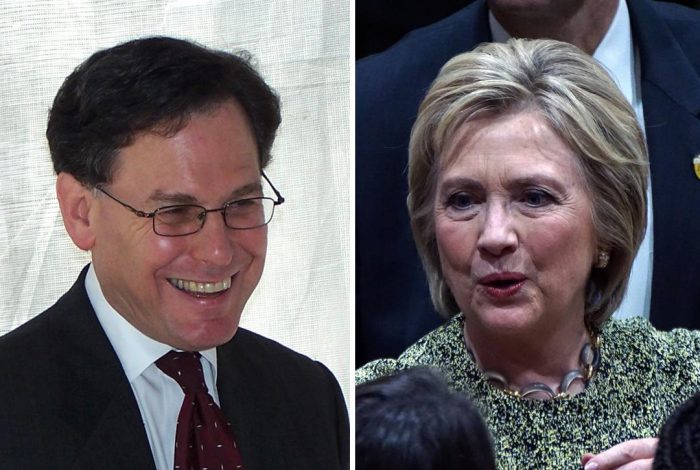
Sidney Blumenthal and Hillary Clinton
Photo credit: Larry D. Moore / Wikimedia CC BY-SA 3.0 and Nathania Johnson / Flickr (CC BY 2.0)
As we head into the home stretch of the presidential campaign, ever-greater scrutiny will be directed at the candidates, their policy decisions and their political and personal connections. While both the war in Libya and Hillary Clinton’s handling of her private email server have been a focus of the media since the primaries, little has been made of how her emails shed light on the build-up and ultimate failure of the war in Libya.
At the center of those emails is Sidney Blumenthal, a longtime Clinton ally and aide.
Though it is not clear that any of the emails sent between them suggest illegal conduct, their correspondence raises serious ethical concerns — including the possibility that Blumenthal was pushing Clinton to support a war whose pursuit might end up benefiting him financially.
A Taste for Conspiracies
Blumenthal got his start in politics campaigning locally for John F. Kennedy in 1960. He left Chicago to attend Brandeis University, outside of Boston, and while there joined the anti-Vietnam war group Students for a Democratic Society (SDS). After graduating, he became part of the circle of progressive journalists emerging in the Boston area in the 1970s.
He spent much of his career writing for The Washington Post and The New Yorker. He met the Clintons in 1987, but did not join the Clinton administration until Bill Clinton’s second term in 1996.
Over the years, Blumenthal was known for two things: his books about conspiracies behind the assassination of both President John F. Kennedy and Martin Luther King Jr. — and his loyalty to Bill and Hillary Clinton.
In 2003, he wrote a book claiming that the Clinton White House had been the victim of serial right-wing conspiracies. Reviewing the book for The Nation, journalist Tom Wicker said it could sometimes be “detailed and fascinating” but failed to provide any dispassionate or objective account of the Clinton years.
Blumenthal has remained loyal, and Hillary Clinton’s emails reveal that she remained close to him throughout her years as Secretary of State.Those emails suggest that Blumenthal’s unsolicited advice to the Secretary of State may have been motivated in part by his financial ties to a company that stood to benefit from US intervention in Libya.
Clinton’s “Secret Spy Network”
Although Blumenthal was denied a spot on Clinton’s staff after President Obama named her Secretary of State, he continued to serve the Clintons in other capacities.
He was paid $120,000 a year by the Clinton Foundation, the Clintons’ international charity. And he worked as a paid consultant to David Brock’s media watchdog group, Media Matters, which monitors rightwing media for accuracy and ethics. The once rightwing, anti-Clinton Brock underwent a political “conversion” in the late 1990s, and recanted all the anti-Clinton articles he had written in the previous decade, claiming he’d been deceived. In fact, it was Blumenthal who had recruited Brock to join the Clinton team in the 90s.
Still, Blumenthal’s relationship with Hillary Clinton while she was Secretary of State had little to do with charitable giving or the media, as his work with the Clinton Foundation and Media Matters might suggest. Instead, it seems that Blumenthal took on a new role with the Clintons, as a kind of foreign policy advisor, or, as ProPublica characterized it, as the head of a “secret spy network” for Hillary Clinton.
What qualifications did Blumenthal have to be a foreign policy advisor? Rep. Trey Gowdy (R-SC), the chairman of the House Select Committee on Benghazi, asked Clinton that question: “We have a CIA, so why would you not rely on [the government’s] own, vetted, sourced intelligence agency?”
But Blumenthal had another reason to offer advice. He reportedly had financial ties to a military contractor that could profit from US engagement in Libya. What those ties were is difficult to define. Blumenthal has described himself as an “honest broker,” trying to bring Libyans together with defense contractors, according to Gowdy.
Specifically, Blumenthal might have benefited, through a kind of “finder’s fee,” if a company called Osprey Global Solutions got a contract in Libya. Osprey, which provided security, weapons, training and intelligence for countries and companies, was trying to line up contracts from the new Libyan government and the US.
Sidney Blumenthal
Photo credit: Son of Broccoli / Flickr (CC BY-NC-ND 2.0)
Fanning the Flames
In lobbying Hillary Clinton to get the US involved in the war in Libya, Blumenthal was also, in effect, lobbying for Osprey to profit from the war.
In July of 2011, Blumenthal sent Clinton an email titled “TNC,” referring to the opposition government in Libya that opposed longtime Libyan leader, Muammar Qaddafi. In the email, Blumenthal let Hillary know about Osprey.
“You should be aware that there is a good chance at the contact meeting in Turkey the TNC ambassador to the UAE, a man you have not met, whose name is Dr. Neydah, may tell you the TNC has reached an agreement with a US company.
The company is a new one, Osprey, headed by former General David Grange, former head of Delta Force, Osprey will provide field medical help, military training, organize supplies, and logistics to the TNC. They are trainers and organizers, not fighters. Grange can train their forces and he has drawn up a plan for taking Tripoli (the capital of Libya) similar to the plan he helped develop that was used by the first wave of Special Forces in the capture of Baghdad.
This is a private contract. It does not involve NATO. It puts Americans in a central role without being direct battle combatants. The TNC wants to demonstrate that they are pro-US. They see this a significant way to do that……
The strategic imperative: Expecting Qaddafi to fall on his own or through a deus ex machina devolves the entire equation to wishful thinking. The TNC has been unable to train and organize its forces. The NATO air campaign cannot take ground. The TNC, whose leaders have been given to flights of fancy that Qaddafi will fall tomorrow or the day after, have come to the conclusion that they must organize their forces and that they must score a military victory of their own over Qaddafi that is not dependent solely on NATO in order to give them legitimacy.”
One day after Blumenthal sent the email, Hillary Clinton recognized the TNC as the legitimate government of Libya, and pledged $30 billion of Libyan assets seized by the American government to the Libyan rebels.
On March 2011, 11 days into the NATO bombing of Libya, Blumenthal sent an email to Hillary Clinton titled “Win The War.” In the email he listed the motivating factors for a US interest in overthrowing Qaddafi.
“The positive case for national interest in terms of removing Q(addafi), establishing stability in North Africa, security democracy in Egypt, economic development, effect throughout Arab world and Africa, extending US influence, counterbalancing Iran the humanitarian motive offered is limited, conditional and refers to a specific past situation”
Blumenthal ended the email “Read the poll. Win the War. No Way Out” and went on to stress how important defeating Qaddafi could be to Obama’s 2012 reelection.
Fighters arrive from around the region to join the National Transitional Council’s
push into Bani Walid, September 10, 2011.
Photo credit: Elizabeth Arrott / Wikimedia
They Were Warned
To be fair, in other emails in February and March 2011, Blumenthal let Clinton know some of the risks of intervention. Both Blumenthal and Clinton received information that pointed to the chance that outside intervention might tip Libya into the chaotic and violent state it in fact became after the fall of Qaddafi.
Islamist activity: Libya’s Islamist activists have maintained a low profile since the start of the insurgency in late February; fearing that their activities would give credence to Qaddafi’s claims that the rebels are terrorists. As the LNC is taking shape, they are now working to make their voice heard, and influence events within the LNC. Ali Sallabi, Salem Al Shiki and Mohamed Al Guirtili, leading Islamic figures who had taken refuge in London (and are close to the Moslem Brotherhood), drafted a “national pact” which looks like a road map for organizing the role of the Islamist movement in the transition to a post — Qaddafi Libya……
Traditionally, the eastern part of Libya has been a stronghold for radical Islamist groups, including the al Qaida-linked Libyan Islamic Fighting Group. While Qaddafi’s regime has been successful in suppressing the jihadist threat in Libya, the current situation opens the door for jihadist resurgence. Egypt has a growing interest in keeping a close eye on jihadist movements in eastern Libya. This is especially true as the Egyptian Military is already concerned about Islamist militancy overflow from Gaza, after their forces were pulled back to Cairo during the uprising against Mubarak.”
It is also clear that Blumenthal and Clinton had information that the “rebels” they supported were dangerous and a threat to Black Africans in Libya. In an email from February of 2011, Blumenthal wrote:
At the same time, a number of these foreign troops have fallen into the hands of demonstrators and been killed, with their bodies set out for public view. There have also been instances where Africans not involved in the fighting have been attacked and killed by the demonstrators.
In his emails to Clinton, the onetime anti-Vietnam-War activist and critic of the CIA, consistently took a hawkish position. Before the US began pushing the UN to sanction a no-fly zone in Libya, Blumenthal advised Clinton to back such a proposal. And Blumenthal pushed Clinton to arm the rebels, even advising her to provide them with armor-piercing bullets.
In the end, the West’s intervention in Libya left the country in a humanitarian crisis and destabilized North Africa, with multiple militias and jihadists spilling over from Libya to neighboring countries like Tunisia. More than a thousand civilians were killed in the NATO airstrikes and thousands more died in the civil war.
Osprey never received a contract, and actually lost money pursuing one.
But in the first flush of victory, Blumenthal rushed to congratulate Clinton and urged her to take credit for the Libyan war — which Obama later called the “worst mistake” of his presidency. In August 2011, a month before Qaddafi was killed, Blumenthal sent the Secretary of State an email that contained the following paragraphs:
“First, brava! This is a historic moment and you will be credited for realizing it. When Qaddafi himself is finally removed, you should of course make a public statement before the cameras wherever you are, even in the driveway of your vacation house. You must go on camera. You must establish yourself in the historical record at this moment……
Do not skimp on the reasons in the US interest behind the successful strategy: We prevented a humanitarian tragedy on a vast scale. Qaddafi, who had already killed 2,000 people in April, threatened to massacre the residents of Benghazi, tens if not hundreds of thousands of people….
We have supported the legitimate aspirations of the Libyan people for democracy and freedom. We have ousted a murderous dictator who has been a source of terrorism, civil war throughout Africa and a prop for dictators elsewhere. By acting in Libya we have helped advance the cause of democracy and freedom throughout the Arab world. We have provided an important support for neighboring Egypt. We have put Assad on notice that the sands of time have run out for him as well. Our successful strategy in Libya stands as a warning that our strategy will work again.
This is a very big moment historically and for you. History will tell your part in it. You are vindicated. But don’t wait, help Clio (the Greek goddess of history) now.”
Following Blumenthal’s advice, Hillary Clinton did indeed take credit for the Libyan war and the eventual murder of Qaddafi on camera, telling a reporter gleefully, “We came, we saw, he died.” When the reporter asked if Qaddafi’s death had anything to do with her recent visit to Libya, she replied, with a laugh, “No…I’m sure it did.”
Zionist mole Sidney Blumenthal with friends
Sidney Blumenthal at a White House Christmas party with Bill and
Hillary Clinton.
Sidney Blumenthal briefs President Bill Clinton in the Oval Office
in 1998.
Zionist mole Sidney Blumenthal with his son Max Blumenthal.
When it comes to his son, we have during the years enjoyed Max Blumenthal's thorough journalistic work to reveal racism in Israel.The old Western proverb; "The apple doesn't fall far from the tree", or the old Swahili (East-African) proverb: "Mtoto wa nyoka ni nyoka" - "The child of a snake is a snake!", have not - yet - played out in the case of Sidney's likewise Jewish son, Max Blumenthal.
But time will tell.
We have seen many cases of rebellious "dissident" Jews, when young, who later in time - as they come of age - change viewpoint and rejoin their flock, going back to the backward doctrines of old...
|
Races? Only one Human race United We Stand, Divided We Fall |
 |
No time to waste. Act now! Tomorrow it will be too late |
|

























